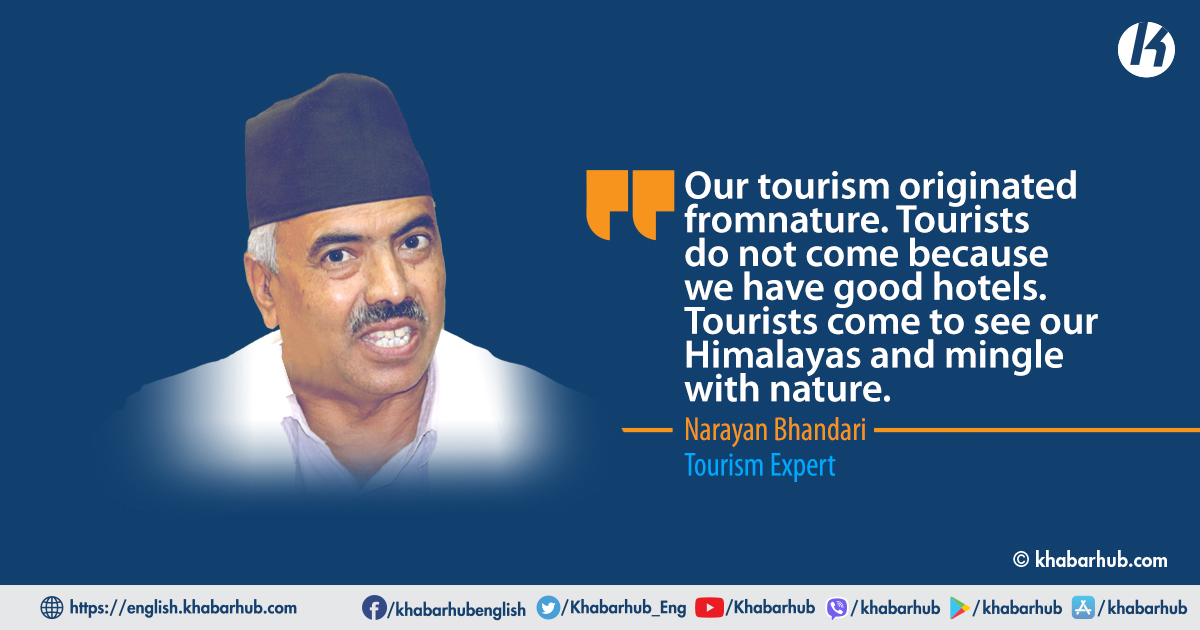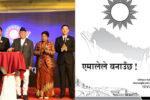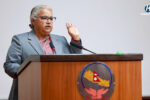KATHMANDU: As a tourism journalist, nature is the subject that I have focused on the most. Nepal’s tourism began with the attractions of nature. Tourists do not come because we have made good hotels. Tourists come to see our Himalayas.
Mahakavi Kalidasa mentioned the Himalayas in his poem Raghuvamsa several years ago. As the great punishment of the earth, the Himalayas, which are the soul of the gods, are spread from east to west.
There has been an encroachment on nature on the pretext of naming the mountains, taking pictures, climbing, naming, flagging, and throwing garbage. The kind of pristine nature that people used to come to see is not there anymore.
Tourists, mountaineers, and mountain lovers have started saying that the waterfall, the mountains, and the Himalayas do not hold the same charm as before.
We talk of infrastructure development, we do not know yet where to develop infrastructure, where to develop tourism, etc. Under the pretext that the Himalayas are common to all, we have defiled the Himalayas.
There should be a core plan on what to develop in the mountains. Mountains have limitations. There should be a clear roadmap on making using the mountains sustainably. Declaring them as tourist areas or a park does not suffice.
Along with nature, there is culture and its glory. Other countries have heritage but culture is broken. In what is known as the temple of Pranaka in India, the sun temple which is built on a very large 7 wheels, is experiencing difficulties in carrying out daily rituals. We don’t have that here. Our living heritage must be respected. We should not mock our own culture.
It should be noted that there is a distinct limitation. Standards should be made for mountain protection. There should be clear guidelines and instructions on who should do what for the protection of nature.
The lack of clarity on whether the maintenance is to be done by the park, the forest department, the tourism ministry, etc. denotes the gap and leaves the mountains deserted in terms of taking responsibility.
Therefore, we have not been able to find the virgin path necessary for tourism development. For this, we have to separate the tourist areas and refrain from doing other activities there.
If there is a place of natural beauty, it should be well-planned on to what extent the development and construction activities can be carried out there.
What about the possibility of encroachment from human settlements? Setting standards for settlements and building hotels is also necessary. Is it rational to take vehicles up to Shey-Phoksundo?
Should the vehicles be allowed up to Sworgadwari? Should there be discrimination between the well-to-do and poor pilgrims? There should be equal treatment for all.
The use of vehicles should be restricted for all in such areas. If they want to go, they should walk for a while. Likewise, it should be decided whether to allow encroachment in the Rara area.
To what points should one be allowed to take the vehicles in Rara national park? What caused deforestation over there? The authority should consider such issues.
We have climbed or let others climb many mountains. Now it has to be controlled. We can enjoy watching from afar. In the mountains, we live with piles of garbage and corpses. How can we claim the water which comes from there is pure?
Bhutan sells mountains to tourism at high prices and does not allow climbing on any mountains. It has the most expensive tourist activity going on.
We have 7 to 8 of the world’s most sensitive mountains above 8,000. Others can’t compete with it and it is very expensive to sit and watch.
Pokhara is the closest city to the Himalayan mountains. The Himalayan mountains are at a distance of 30 km. It must be the most expensive in the world. We talk about excellence, we have to make the price right?
We say that Everest is included in the World Heritage List. However, do the Nepalese understand its sensitivity? Did you clean it?
So let’s all do nature-friendly work. First of all, we should also have courses on natural beauty in colleges, and universities, and keep nature as the first priority. When the buses, the helicopters, and other vehicles are taken there, nature there is spoiled, isn’t it?
Therefore, the area should be separated for where to prepare food. We should respect the culture and worship that nature. Only then will tourism develop. Every mountain has gods and goddesses that must be protected.
We don’t need to spend a lot of money to advertise by placing photos, we can just keep it clean, it is an advertisement itself. Tourists have not declined merely because it is expensive now.
They are reduced due to dirt. Therefore, for the development of tourism, we should put the conservation of nature as the first priority.
Along with nature, there is culture and its glory. Other countries have heritage but culture is broken. In what is known as the temple of Pranaka in India, the sun temple which is built on a very large 7 wheels, is experiencing difficulties in carrying out daily rituals. We don’t have that here. Our living heritage must be respected. We should not mock our own culture.
We say we are poor. We are culturally very poor. There are goddesses, Mahadevs, temples, lamas, and Rinpoche’s meditation caves. There are lakes and well with bathing facilities.
That mountain area has a culture. It is said that it has kept nature clean. It is said that one should not spit or urinate around the temple.
Therefore, the area should be separated for where to prepare food. We should respect the culture and worship that nature. Only then will tourism develop. Every mountain has gods and goddesses that must be protected.









Comment